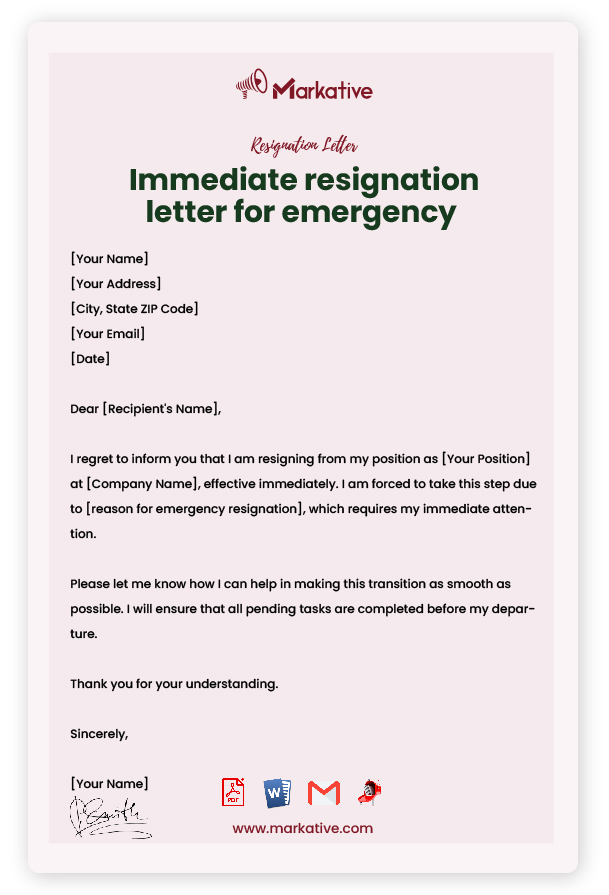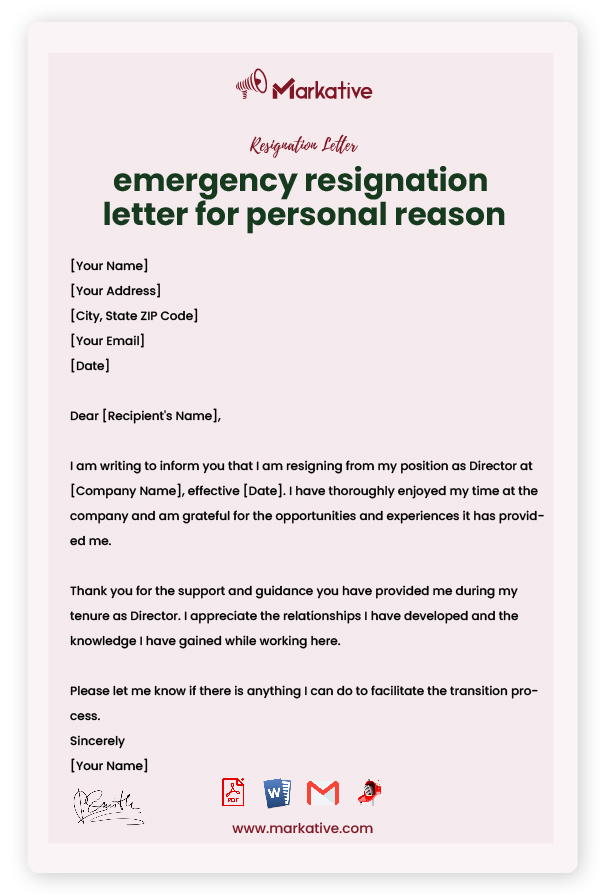When you’re in a job that no longer suits your professional goals or personal interests, it might be time to consider resigning. Resignation letters are a formal way of notifying your employer that you are leaving your current position, and they’re essential in maintaining a positive professional relationship with your employer. A well-crafted resignation letter can help you leave on good terms, and it’s especially important in cases of emergency resignations. In this article, we’ll discuss why Emergency Resignation Letter are important, how a good resignation can create an impact, and why you should read on to learn more.
Emergency resignation letters are necessary in situations when you need to leave your job immediately, often without much notice. These situations can include serious illness, family emergencies, or sudden job opportunities that require immediate attention. A well-written emergency resignation letter can help you maintain your professional reputation and ensure a smooth transition for your employer.
Moreover, a good resignation letter can create a lasting impact on your professional relationships. Leaving on good terms can open up opportunities for future collaborations and networking, and it can also help you secure positive references in the future. By taking the time to craft a thoughtful resignation letter, you can leave a positive impression on your employer, even if you’re leaving under less-than-ideal circumstances.
Finally, if you’re curious about how to write a great emergency resignation letter that will leave a lasting impact on your professional relationships, then keep reading. In this article, we’ll cover everything you need to know about crafting a resignation letter that will help you leave your job with grace and professionalism. Whether you’re leaving due to an emergency or just looking to transition into a new role, these tips will help you make the most of your resignation letter and leave a positive impression on your employer.
How To Write Appealing Emergency Resignation Letter?
Writing an emergency resignation letter can be challenging and stressful. However, by following some simple steps and using effective examples, you can write an appealing emergency resignation letter that will help you leave your job gracefully.
5 Steps on How To Write Appealing Emergency Resignation Letter With Examples:
- Keep it brief and to the point: State your reason for resignation and the date of your last working day. Avoid going into too much detail about the circumstances leading to your resignation.
Example: “Due to unforeseen personal circumstances, I regretfully tender my resignation, effective immediately.”
- Express gratitude: Thank your employer for the opportunity to work with them, and express your appreciation for the experience gained during your tenure.
Example: “I am grateful for the support and guidance provided by the company during my time here.”
- Offer assistance: If possible, offer to help with the transition process by completing any pending tasks or training your replacement.
Example: “I would be happy to assist with the transition by completing any outstanding tasks and ensuring a smooth handover to my replacement.”
- Provide contact information: Provide your contact details so that your employer can reach out to you if needed.
Example: “You can reach me at [phone number] or [email address] if you require any further information or assistance.”
- Sign off respectfully: End your letter on a positive note, wishing your colleagues and the company success in the future.
Example: “I wish the company and my colleagues continued success and growth in the future.”
Conclusion: By following these steps and using examples, you can write an appealing emergency resignation letter that will help you leave your job on a positive note. Remember to keep it brief, express gratitude, offer assistance, provide contact information, and sign off respectfully.
For More: How To Write Best Resignation letter Due to Pregnancy [5+ Templates]

Emergency Resignation Letter with Notice Period
[Your Name] [Your Address] [City, State ZIP Code] [Your Email Address] [Date] [Employer's Name] [Company Name] [Address] [City, State ZIP Code] Dear [Employer's Name], I regret to inform you that due to unforeseen circumstances, I must resign from my position as [Your Job Title] effective [Date of Resignation]. I understand that my employment contract requires me to provide [Notice Period] notice period, and I intend to honor this commitment. I apologize for any inconvenience this may cause and will ensure that I will do everything possible to make the transition process as smooth as possible. I am willing to assist in training a replacement and will complete all outstanding projects and tasks assigned to me. Please let me know the procedures that I need to follow for a smooth handover. I will ensure that all my work is complete and handed over before my last day of work. I want to take this opportunity to thank you for the opportunities, experiences, and support you have provided me during my time here. I have learned a lot, and it has been a pleasure working with you and the team. If there are any further instructions or procedures I need to follow, please do let me know. Sincerely, [Your Name]
Emergency Resignation Letter without Notice Period
Dear [Manager's Name], I regret to inform you that I must submit my immediate resignation from my position as [Your Position] at [Company Name]. I apologize for the sudden nature of this decision, but unforeseen circumstances have made it necessary for me to leave the company immediately. I understand that this resignation comes without the required notice period, and I apologize for any inconvenience this may cause. However, I assure you that I will do everything in my power to ensure a smooth transition and handover of my responsibilities to my colleagues. I would like to take this opportunity to thank you for the opportunities provided to me during my time at [Company Name]. I am grateful for the experience and knowledge gained during my tenure here. Please let me know if there is anything I can do to assist in this transition period. I will ensure that all necessary documents and files are handed over to my colleagues before my departure. Thank you for your understanding. Sincerely, [Your Name]
For More: How To Write Appealing Short Resignation Letter [ 7+ Free Samples]
Emergency Resignation Letter with Reason
Dear [Manager's Name], I am writing to inform you that I am resigning from my position as [Job Title] effective immediately. I apologize for the suddenness of my resignation, but I have been presented with a situation that requires my immediate attention. Unfortunately, due to unforeseen circumstances, I must attend to a personal emergency that requires my full attention and presence. This emergency is not related to my work or anyone in the workplace. I understand that my resignation may cause some inconvenience to the company and my colleagues, and for that, I sincerely apologize. I will do everything in my power to ensure a smooth transition and handover of my responsibilities to my successor. I have enjoyed my time working with this company and appreciate the opportunities that were presented to me. I will miss working with my colleagues, and I hope that we can stay in touch in the future. Thank you for your understanding during this difficult time. Please let me know if there is anything I can do to help with the transition process. Sincerely, [Your Name]
Emergency Resignation Letter without Reason
[Your Name] [Your Address] [City, State ZIP Code] [Your Email] [Date] [Employer's Name] [Employer's Address] [City, State ZIP Code] Dear [Employer's Name], It is with regret that I must submit my resignation from my position as [Your Position] effective immediately. I apologize for any inconvenience that this may cause. Please be assured that this decision was not an easy one, but due to unforeseen circumstances, I am unable to continue in my current role. I will do everything in my power to ensure a smooth transition during this time. I would like to take this opportunity to thank you for the opportunities that you have provided me during my time at [Company Name]. I have learned so much and have grown both personally and professionally because of my time here. I understand that my sudden departure may cause some inconvenience and I apologize for that. If there is anything I can do to make the transition smoother, please do not hesitate to reach out to me. Thank you again for your understanding in this matter. Sincerely, [Your Name]
Urgent Emergency Resignation Letter Sample
Dear [Manager's Name], I am writing to inform you of my immediate resignation from my position as [Your Position] at [Company Name]. I regret to inform you that due to unforeseen personal circumstances, I must resign from my role effective immediately. I understand that this resignation comes at a difficult time for the company and I apologize for any inconvenience this may cause. I will do my best to ensure a smooth transition of my duties over the next [number of days, if applicable] in order to minimize any disruption to the team. I would like to take this opportunity to express my gratitude to the company for the opportunities and experiences that I have had while working here. I have learned a great deal from my time at [Company Name] and I am grateful for the support and guidance that I have received from my colleagues. I would be happy to assist in any way possible during this transition period and will ensure that all outstanding work is completed and handed over appropriately. Thank you for your understanding in this matter. Sincerely, [Your Name]
How Much Notice Should You Give for a Emergency Resignation Letter?
According to the U.S. Bureau of Labor Statistics, the average tenure for employees in 2020 was 4.1 years, with the highest turnover rates in the hospitality, retail, and healthcare industries. In a study conducted by Glassdoor, 60% of employees who resigned did not give notice to their employer. This highlights the importance for employers to have contingency plans in place to handle unexpected departures.
In the case of an emergency resignation letter, it is best to give as much notice as possible, but sometimes circumstances may not allow for a standard notice period. It is recommended to give at least two weeks’ notice if possible, as this is considered a standard notice period and allows employers time to make arrangements for a replacement. However, in the case of a true emergency, such as a sudden illness or family emergency, it may not be possible to give two weeks’ notice. In such cases, it is important to communicate the situation to the employer as soon as possible and provide as much notice as feasible under the circumstances.
Is it Ok To Email a Emergency Resignation Letter?
In general, it is not recommended to email an emergency resignation letter, as it can be seen as unprofessional and disrespectful to your employer. It is always better to have a face-to-face conversation or a phone call with your supervisor or HR representative to explain the situation and submit your resignation formally. However, in some cases, such as when you are unable to physically be present at work or have a very urgent matter that requires immediate attention, emailing a resignation letter may be necessary. In these cases, it is important to be clear, concise, and professional in your communication.
For example,
"Dear [Supervisor's name], I regret to inform you that due to unforeseen circumstances, I am unable to continue working at [Company name]. Please accept this email as my formal resignation, effective immediately. I appreciate the opportunities and experiences I gained during my time at the company, and I apologize for any inconvenience this may cause. Thank you for your understanding.
Common Mistakes When Writing a Emergency Resignation Letter?
- Lack of Clarity: One common mistake in writing an emergency resignation letter is not clearly stating the reason for resignation. It’s important to be clear and concise about the reason for leaving to avoid any confusion or misunderstandings.
- Emotional Content: Another common mistake is allowing emotions to affect the tone and content of the letter. An emergency resignation may be a stressful and emotional experience, but it’s important to remain professional and avoid any negative or accusatory language.
- Lack of Gratitude: Finally, forgetting to express gratitude to the employer and co-workers for the opportunities and experiences gained while working there can be a mistake. It’s important to express appreciation and thankfulness for the time spent working with the company and team.
For More: How To Write Resignation letter for personal reasons [5 Free Samples]

Conclusion:
Writing an emergency resignation letter can be a difficult task, but it is important to do so professionally and respectfully. The timing of sending your resignation letter is crucial and it is recommended to do so as soon as possible to ensure a smooth transition for both you and your employer. Common mistakes to avoid include being too emotional, not giving enough notice, and not providing a clear reason for your resignation. It is also important to choose the appropriate tone and language for your letter, keeping in mind the professional relationship you have with your employer.
To make the process easier, we have provided multiple free and ready-to-use templates that you can customize to fit your specific situation. It is important to remember that resigning from a job can be a sensitive and emotional time, but by following these guidelines and using our templates, you can ensure that you are leaving on a positive note and maintaining a good relationship with your employer.







